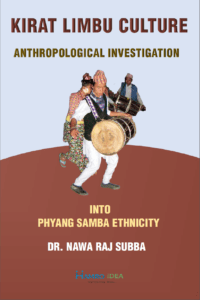
Book Introduction
Here is about Kirat Limbu Culture. Human existence is believed to be incomplete without the enrichment of culture. Some individuals wholeheartedly immerse themselves in their cultural surroundings, while others observe from a distance.
The ancient Kirat civilization of Nepal predates any religious texts we have. Unfortunately, their profound cultural wisdom has primarily faded, leading to a disheartening void in our understanding of ancient knowledge. The plight of the indigenous communities in the land nurtured by their toil and sacrifice is a cause for concern. Neglecting the valuable contributions of these indigenous communities in the name of progress leaves us incomplete.
Through a thorough anthropological study of the Kirat Limbu community, we’ve arrived at factual and logical conclusions regarding the questions they’ve raised. This writer endeavors to share this information, driven purely by academic value and recognition.
Recognizing his responsibility, this writer, in the later stages of life, has felt a sense of urgency in preserving the positivity of research. The book is published to document synthesized knowledge based on trustworthy information and data, thereby sharing it with readers.
This book has expected to be a valuable resource for those seeking to understand the true essence of Nepali soil, to explore the rich Kirat civilization, its culture, and the intricate tapestry of ethnic issues—best of luck on this enlightening journey.
पुस्तक परिचय Kirat Culture
भनिन्छ संस्कृति बिना मान्छेको जीवन अपूर्ण हुन्छ। यही पूर्णताका लागि मानिस संस्कृतिमा लीन हुन्छन् कोही अलि टाढा बसेर त्यही संस्कृति नियाल्दछन्।
नेपालका किरात जाति कुनै पनि प्राचीन धर्म ग्रन्थ भन्दा पुराना जाति हुन्। यिनीहरूका संस्कृति अनि ज्ञान आज ओझेलमा परेका छन्। यही अन्यौलपन आज पीडा बनेको छ। आदिवासीका रगत र पसिनाले सिंचिएको भूमिमा आज तिनका अस्तित्व ओइलाउँदै जानु पक्कै चिन्ताजनक विषय हो। हामीले आधुनिकताका नाममा आदिवासीका योगदानलाई भुल्यौँ भने हामी अझै अपूर्ण रहने छौँ।
किरात लिम्बू समुदायको मानवशास्त्रीय अध्ययनद्वारा उनीहरूमाझ उठेका कतिपय सवालमा तथ्यपूर्ण र तर्कपूर्ण निष्कर्ष आएका छन्। पाठकलाई ती सूचना जानकारी गराउन यो लेखक अघि सरेको छ। यो प्रयास विशुद्ध प्राज्ञिक मूल्य र मान्यतामा आधारित छ।
आफ्नो दायित्व सम्झेर जीवनको उत्तरार्धमा यो लेखकले अनुसन्धानको सकारात्मकबाद समातेर एक निचोडमा पुगेको महसुस गरेको छ। प्राप्त भरपर्दा सूचना र तथ्याङ्कलाई आधार मान्दै संश्लेषित ज्ञानलाई अभिलेख राख्न साथै पाठकसमक्ष साझा गर्न पुस्तक प्रकाशित गरिएको हो।
नेपाली माटोको सही पहिचान जान्न र बुझ्न चाहने पाठक, अनुसन्धातालाई किरात सभ्यता, संस्कृति र जातीय सवाल छिचोलेर अघि बढ्न पुस्तक एक सहयोगी सामग्री बनेको छ। शुभकामना।
